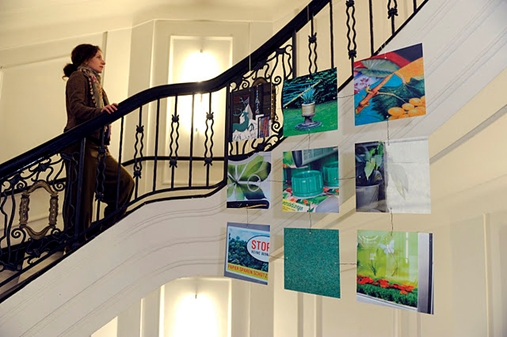In modern societies, private consumption is a multifaceted and ambivalent phenomenon: it occurs as a necessary part of prevailing social practices and it is an economic driving force; yet at the same time, its consequences are in conflict with important social and environmental sustainability goals. Finding paths towards “sustainable consumption” has therefore become a major political issue. However, despite considerable knowledge about the unsustainability of current consumption patterns and numerous initiatives in the field of consumer information, a general trend towards sustainable consumption has yet to develop.

Staircase decoration by Sonja Schenkel at the conference venue, the Curiohaus in Hamburg (photo: Christian Augustin)
The international scientific conference “Sustainable Consumption – Towards Action and Impact”, held from 6 -8 November 2011 in Hamburg, Germany, aimed at bringing together the emerging multidisciplinary community dealing with questions around sustainable consumption.
Our report aims at making accessible some of the discussions of the conference. It is not so much a summary as it is an attempt to build overarching arguments to which the single conference presentations can be regarded as contributions. Two broader storylines have been chosen to organize the contributions to the conference (and to the pre-conference) within a cohesive framework:
- For a policy aiming at sustainability, is steering consumer behaviour a promising route (or should we rather focus on regulation of production)?
- How can research on sustainable consumption inform recommendations for political action?
To facilitate navigation through the various contributions, the report uses a technique called argument mapping, which was developed as a tool for computer-supported collaborative research and argumentation in the context of Debattenprofis.de.
Here’s the link the the online-version of the report:
